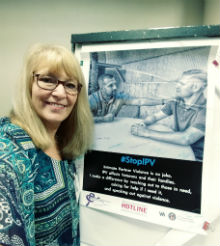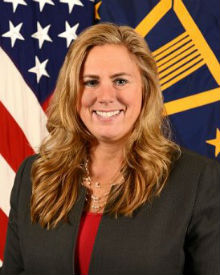MIRECC / CoE
Rocky Mountain MIRECC for VA Suicide Prevention
Rocky Mountain Short Takes on Suicide Prevention: The Intersection of Intimate Partner Violence & Suicide Prevention with Drs. LeAnn Bruce, Keita Franklin and Lindsey Monteith
12 September 2018

This podcast is an excellent example of the collaborative relationship between the VA Intimate Partner Violence Assistance Program and the VA Suicide Prevention Program in their mutual efforts to prevent both intimate partner violence (IPV) and suicide for those who have served.
Both Suicide and IPV are serious public health concerns that affect many individuals in the general population and which share several factors associated with elevated risk. Such factors include poverty, employment and housing challenges, food insecurity, racism and gender inequality, and history of trauma and abuse.
Veterans may be disproportionally affected by these issues as well as additional factors, such as having experienced other traumatic events, substance misuse, traumatic brain injury, depression, posttraumatic stress disorder, and feelings of disconnection from family or friends. The impact of these challenges on an individual can be substantial, including affecting one’s ability to cultivate and sustain close relationships.
It is recognized that close relationships serve as protective factors, helping individuals overcome the negative effects of depression, trauma, and suicidal thoughts. Cultivating or strengthening healthy relationships significantly benefits the individual, partners and family while reducing risk for suicide and intimate partner violence alike.
Within the Veteran population, contextual/situational and bi-directional forms of IPV may indicate that stressors have overcome individuals’ and couples’ existing coping skills. Intervention can help couples build healthy communication and intimacy skills, especially when intervention occurs early. These programs and interventions address not only the identified IPV behaviors, but also provide the Veteran the opportunity to explore how trauma affected his or her ability to connect with others, to regulate emotion and to build trust again.
Listen to the podcast
WHAT IS THE VA DOING TO HELP?
Our mutual mission is to support the implementation of a comprehensive, integrated system of programs and services aimed at ending Suicide and Intimate Partner Violence. This is being accomplished by providing education, prevention, establishing collaborative relationships with community partners, implementing screening and early identification of those affected, and offering an array of intervention choices.
Suicide Prevention
- VA is working to reduce suicide risk among all Veterans, whether or not they are enrolled in VA health care. Our goal is to equip communities in helping Service members and Veterans get the care that is right for them, whenever and wherever they need it.
- Every VA has a Suicide Prevention Team that provides training, support and intervention within the VA system, while also building community partnerships to help community partners better understand the needs of Veterans and their families.
- VA has made great strides in Veteran suicide prevention, especially in crisis intervention. We will not relent in our efforts to connect Veterans who are experiencing an emotional or mental health crisis with lifesaving support.
- The Veterans and Military Crisis Line connects Veterans in crisis and their families and friends with qualified, caring VA responders through a confidential toll-free hotline, online chat, or text. Veterans and their loved ones can:
- call 1-800-273-8255 and Press 1,
- chat online at VeteransCrisisLine.net/Chat, or
- send a text message to 838255
- VA’s online resource locator helps Veterans easily find VA resources in their area, including Suicide Prevention Coordinators, crisis centers, VA medical centers, outpatient clinics, Veterans Benefits Administration offices, and Vet Centers.
Intimate Partner Violence
- The VHA Intimate Partner Violence Assistance Program (IPVAP) site Coordinators offer a wide range of integrated programs and services aimed at supporting VA providers in assessing and addressing IPV for Veterans, their partners and Caregivers, as well as VA staff impacted by IPV.
- Services offered include education, prevention, screening, and intervention, as well as collaborating with local community programs.
- The VHA IPVAP works with a variety of internal programs whose aim is to strengthen and promote healthy relationships. Programs include the Warrior to Soul Mate program, Cognitive Behavioral Therapy for Couples, Family Services and Veterans Readjustment Counseling centers.
- VHA IPVAP also provides an array of Evidence-based, Trauma-informed therapy options for Veterans who use or are at risk of using IPVAP, including the Strength at Home Program.
- Talking to your VA providers can make a difference. While IPVAP recognizes that both men and women experience IPV, studies indicate that women who talk to their healthcare providers about IPV are 4 times more likely to use an intervention and 2.6 times more likely to exit the abusive relationship.
- IPVAP advocates for screening all Veterans for IPV in order to provide education and intervention when needed.
- IPVAP supports practice of screening for both IPV & suicide risk as each can increase risk for the other.
- For more information, please visit the IPVAP Website at https://www.socialwork.va.gov/IPV/Index.asp
- The National Domestic Violence Hotline
- 1-800-799-7233 or
- www.thehotline.org
Additional Resources for Veterans and Military
- The Rape, Abuse & Incest National Network (RAINN) is the Nation’s largest anti-sexual violence organization. RAINN created and operates the National Sexual Assault Hotline (1-800-656-4673 or online.rainn.org) in partnership with more than 1,000 local sexual assault service providers across the country.
- Futures without Violence is a national organization that has been providing support, education, research and resources to individuals and organizations for over 30 years. They are a supporting stakeholder for the VA’s Intimate Partner Violence Program. (www.futureswithoutviolence.org).
- The DoD BeThere Peer Support Call and Outreach Center (844-357-7337) provides 24/7 confidential and anonymous non-clinical peer-to-peer support to Service members and their families.
- The DoD Safe Helpline (877-995-5247) is the DoD’s anonymous hotline for members of the military community affected by sexual assault. This helpline is run by RAINN.
Definitions & Terminology
- Intimate Partner Violence
- Intimate Partner Violence is a specific form of domestic violence. It is defined as the physical, sexual, or psychological harm (including stalking behavior) by a current or former partner. It can occur on a continuum of frequency and severity, ranging from occasional emotional abuse to chronic, severe battering or even death. IPV can occur in heterosexual or same-sex relationships and does not require sexual intimacy or cohabitation (CDC, 2016).
- Trauma-Informed Care
- Trauma-Informed Care describes an organizational structure and treatment framework that involves understanding, recognizing, and responding to the effects of all types of trauma. Trauma-Informed Care also emphasizes physical, psychological and emotional safety for both consumers and providers, and helps survivors rebuild a sense of control and empowerment. http://traumainformedcareproject.org
SPEAKERS
 LeAnn E. Bruce, LCSW, PhD, National Program Manager, Intimate Partner Assistance Program, Office of Care Management and Social Work, U.S. Department of Veterans Affairs
LeAnn E. Bruce, LCSW, PhD, National Program Manager, Intimate Partner Assistance Program, Office of Care Management and Social Work, U.S. Department of Veterans Affairs- Dr. Bruce is a licensed clinical social worker with over 25 years of experience working with individuals and families impacted by Domestic Violence and Intimate Partner Violence. She has worked across a variety of programs in the community, Department of Defense and Veterans Affairs. She currently serves as the National Program Manager for the VHA Intimate Partner Violence Assistance Program, which serves Veterans, their partners, and VA staff impacted by intimate partner violence. She received her PhD in Social Work research from the University of Louisville and serves as adjunct faculty for Western Kentucky University’s School of Social Work.
 Keita Franklin, LCSW, PhD Executive Director, Suicide Prevention U.S. Department of Veterans Affairs Office of Mental Health and Suicide Prevention
Keita Franklin, LCSW, PhD Executive Director, Suicide Prevention U.S. Department of Veterans Affairs Office of Mental Health and Suicide Prevention- Dr. Keita Franklin, a member of the Senior Executive Service, is the Executive Director, Suicide Prevention for the U.S. Department of Veterans Affairs Office of Mental Health and Suicide Prevention. Dr. Franklin serves as the principal advisor to VA leadership for all matters pertaining to suicide prevention. She leads a team of experts engaged in research, program evaluation, innovation, program development, data and surveillance, and partnerships. Before joining VA, Dr. Franklin served as the Director of the Defense Suicide Prevention Office where she was responsible for policy and oversight of the U.S. Department of Defense suicide prevention programs.
- She is a licensed social worker with a specialization in children and families, and has a PhD in social work with specialized training and certifications from the Center for Advancement of Research Methods and Analysis. Dr. Franklin received a leadership award from Virginia Commonwealth University for leading efforts to help train and advise the social work profession on working with military families.
 Lindsey L. Monteith, PhD, Moderator
Lindsey L. Monteith, PhD, Moderator- Dr. Monteith is a licensed clinical psychologist and Investigator in the VA Rocky Mountain Mental Illness Research, Education and Clinical Center (MIRECC) for Suicide Prevention. Her research examines the ways in which trauma and trauma sequelae influence risk for suicidal ideation and suicidal self-directed violence, as well as identification of risk and protective factors for suicide among survivors of sexual violence. Dr. Monteith has contributed to the development and adaptation of different interventions for suicide prevention within the Veteran population. She is an Assistant Professor in the Department of Psychiatry at the University of Colorado Anschutz Medical Campus.
You can find all our podcasts at iTunes on your iPhone or on your Android device. You can also find all our episodes at our host site. Other places where you can find our podcasts include: iHeart Radio, and Blubrry.
Categories: Suicide Prevention
Site Map
Contact Information
Denver
Rocky Mountain Regional VAMC (RMR VAMC)
1700 N Wheeling St, G-3-116M
Aurora, CO 80045
720-723-6493
Salt Lake City
VA Salt Lake City Health Care System
500 Foothill DR
Salt Lake City, UT 84148
801-582-1565 x2821




















